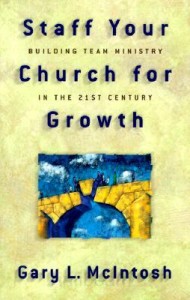 I was excited to read this book as a pastor because I always want to know what I can do to help our church to move forward and staffing is always a difficult issue to deal with. Staff Your Church For Growth is a book that pastors should read early in their ministry because it gives great insights for the ways that staffs should be organized by balancing certain gifts and personalities against one another.
I was excited to read this book as a pastor because I always want to know what I can do to help our church to move forward and staffing is always a difficult issue to deal with. Staff Your Church For Growth is a book that pastors should read early in their ministry because it gives great insights for the ways that staffs should be organized by balancing certain gifts and personalities against one another.
For instance, visionary leaders often need to be balanced with staff members who are organized managers.
Staff Your Church for Growth is also valuable as a resource to guide churches and pastors in hiring staff. The charts and tables included in the book show where and when to hire staff and the book serves as a strong reminder that staff should be hired both in response to current and past growth but in anticipation of future growth as well. A church needs to plan and structure to be at the next level now or the next level will never arrive.
McIntosh also has some stark weaknesses in this book, however. I was disappointed in the professionalization of ministry in this book. Professionalization is a temptation in ministry that seems to be running rampant today, but rather than speaking to this issue, McIntosh does much to perpetuate the idea that ministers are primarily employees rather than servants of the Most High God.
For instance, on page 121, McIntosh lists five factors that pastors must answer for staff members:
Why are we here?-Mission Where am I going?-goals How am I doing?-Feedback What’s in it for me?-rewards? What happens when I need help?-support
In a book about the church that purports to give a great deal of emphasis to the team approach to ministry, this list is very ego-centric. Of the five questions above, four include singular pronouns. In other words, the ministry approach supported here is a ME ministry rather than a God-glorifying ministry.
Obviously this book has much to offer and should be read, but the temptation to professionalize ministry should be avoided at all costs. The author and publishers would do well to revisit these issues and make this book an even more valuable asset to the church and to church leaders.

